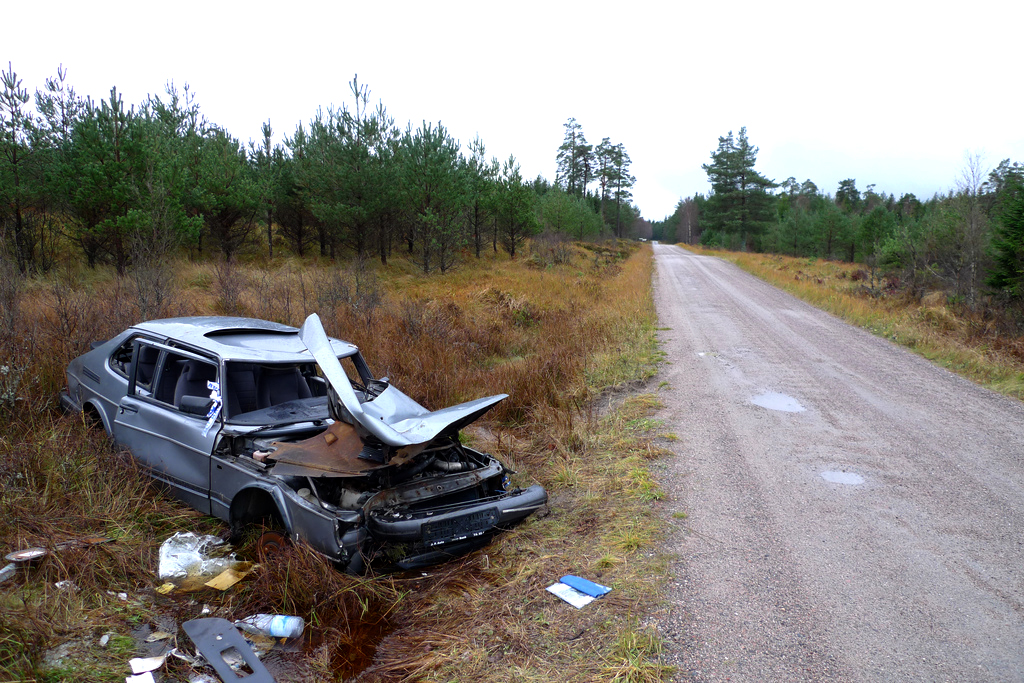I drove ninety miles from Bangor to Lubec, Maine on day three of a three-day hangover. The dehydration pounded against my eyeballs, scraped its sharp fingernails along the inside of my skull. Sobriety had been a hard, one-year streak, a good try, ended just four days prior. The road blurred past, much as the binge had—quickly and with little definition.
In Bangor, at the car repair place, I had sucked Diet Coke through a straw, listening to the rattle of the ice, while the mechanic told me that something called the ABS controller in my old Saab was broken. This black box of electronics had to be shipped to New Jersey for repair. It would be gone for a month and cost hundreds of dollars, but the car would still be drivable.
He said, “You won’t have anti-lock brakes, but you’ll still be able to stop.”
I took a sip of soda and thought about how I hadn’t been able to stop for years without going into a skid.
I authorized the work and wrote a check. The mechanic removed the part, and I was free to leave.
“Oh, by the way,” he said, once it was too late to change my mind. “Your speedometer won’t work either.” Seeing my eyes widen, he chuckled. “Guess you’ll just have to drive slow.”
Slowing down sounded fine. I ate a handful of Tylenol to get me across the ninety miles to home, and got behind the wheel.
I drove from Bangor to Lubec, past the hunting lodge, the derelict Cloud 9 hotel, and the logging roads. My sunglasses turned it all to amber, took away the brightest tones and vanished the dark ones. Was I going too fast? Too slow? The gauges were missing, and I had to rely on external cues—other cars, the blurred roadside. My odometer didn’t work either, so on my road to nowhere, I wasn’t even making any miles.
It was time to give up. On this old car, I mean, but also on any hope of moderating my drinking. My willpower was like a young babysitter who put on movie after movie for me so she could talk on the phone with her boyfriend, but I could sneak past her if I waited for the right moment. My addiction was trickier than its keeper.
The sun beat down through the sunroof, making my headache worse, but I liked that. I had always liked hangovers. I liked their clawed tenacity. My hangovers were strict babysitters, enforcing rules: no junk food, no staying up late, no loud music. Good hangovers kept me in line long enough to make all sorts of promises I had no hope of keeping. Good hangovers took me to the outer margins of my errors and made me pay for the effort it took to see them clearly. Like squinting at a bright light. That pain felt redemptive somehow, like it forced me to stare hard enough to really see, over and over, like the light breaking through the shade of trees on a roadside.
My speedometer stayed at zero. Trees and gas stations, houses and schools, blurred past my periphery, but I wasn’t moving.
I thought of myself running on a treadmill for hours at a time during the first months of sobriety, sometimes deep in the night. I lifted my feet, one at a time, put them down in the same spot, but somehow made miles. I worked up a sweat without going anywhere.
The forests between Bangor and Lubec slid by my car, and a cobalt sky sang of spring above my crashing head. Ninety miles went under my tires. I kept the cup of cola in my hand, now reduced to cool, brown water. I liked the chill against my palm, the way it made my skin ache, the way the condensation made me feel slick. Staying between the margins, I kept the car pointed forward, let the pain killer work, and drove home. I imagined that this road was a treadmill, that I wasn’t moving ahead so much as the world was in motion, that the earth was the spinning belt. To make miles, I had to step off.

